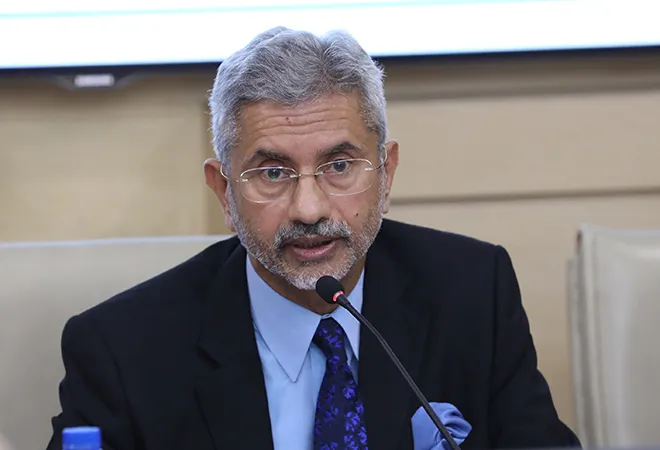
In making Bhutan his first port of call, External Affairs Minister (EAM) S. Jaishankar continued the tradition set by Prime Minister Narendra Modi who five years ago, chose Bhutan for his
maiden overseas visit. Jaishankar’s
two-day visit began from 7th June, underlining the strategic importance of Bhutan for India. As only a couple of years ago, the Himalayan kingdom
backed India during the latter’s standoff with China at the disputed Doklam plateau.
With China,
stepping up its effort to engage Bhutan, Jaishankar who steered India past the Doklam standoff as its Foreign Secretary has a task at hand i.e. sustain and advance the
‘special ties’ that the two countries share. The visit is in line with India’s Neighbourhood First policy and marks the start of a series of initiatives to enhance partnerships with South Asian countries.
Robust partnership
Bhutan in October last year
voted to power a little-known party in the country’s political circles, Druk Nyamrup Tshogpa (DNT); the latter remaining
silent on foreign policy during its election campaign. This stance by the ruling party of now in Bhutan had led to the
speculation to many, as the indication of Thimphu weaning away from New Delhi’s sphere of influence.
However, the new government in Bhutan that was eyeing at developmental assistance from India setting aside all speculations announced Thimphu’s commitment towards protecting New Delhi’s strategic interests.
With China, stepping up its effort to engage Bhutan, Jaishankar who steered India past the Doklam standoff as its Foreign Secretary has a task at hand i.e. sustain and advance the ‘special ties’ that the two countries share
Bhutan’s Prime Minister, Dr. Lotay Tshering
visited India in December last year and sought support for the country’s 12
th Five Year Plan. India announced support for the Bhutan’s plan of
Nu. 45 billion supposed to be a transitory plan for turning Bhutan into a developing country.
The concluded visit of the External Affairs Minister was to assure Thimphu of New Delhi’s continued support to its socio-economic development. Jaishankar is also likely to advocate strong political relations between the two countries considering that there’s a new party in power in Bhutan, the DNT.
Bilateral relations between the two countries completed
50 years last year and a host of programmes were held to mark the historical moment. Also, a bilateral visit of the Indian Prime Minister, Narendra Modi was speculated to happen, that somehow didn’t happen. Jaishankar’s visit is likely to be followed by Indian Prime Minister’s visit later this year.
The DNT government in Bhutan came to power on the slogan
“Narrowing the Gap” and has looked at addressing income disparity and growing unemployment. The government is also looking to
diversify Thimphu trade, the latter largely dominated its hydropower exports to India.
Also, Bhutan is all set to
graduate from UN’s Least Developed Country status by 2023 and a robust economy with vibrant private sector is a requisite for that. Thimphu cannot for long resist foreign direct investment and opening up its market. It is also eyeing at the membership of the World Trade Organization.
The rationale for Bhutan’s civil society to open up to China is premised on the need for diversifying its foreign trade that it argues to be heavily leaning in India’s favour.
China’s advances
Bhutan
declined an invitation to attend the Belt and Road Initiative (BRI) conference held in Beijing in April this year that saw the participation of more than 40 heads of states. However, if Bhutan’s media is to go by, its civil society is
warming up to China’s advances. The rationale for Bhutan’s civil society to open up to China is premised on the need for diversifying its foreign trade that it argues to be heavily leaning in India’s favour.
Though, Chinese offers to further intensify trade have so far been snubbed by Thimphu, the prowess of the Chinese economy is having a marked influence upon Bhutan’s urban population with internet available on fingertips. Chinese exports to Bhutan in terms of value are
third, closely reeling behind India and South Korea, which are first and second largest exporters.
The pressure on the government was palpable when Prime Minister Dr. Lotay Tshering in January this year had reportedly said that his country is willing to
strengthen pragmatic cooperation with China including tourism and resolve the border issue at an early date through friendly consultations.
In the backdrop of such developments, it is important for the Indian EAM to focus on strengthening political relations between the two countries. The visit by the former diplomat and India’s most experienced crisis manager is timely and hopes to check China’s growing influence in the region.
The views expressed above belong to the author(s). ORF research and analyses now available on Telegram! Click here to access our curated content — blogs, longforms and interviews.
 In making Bhutan his first port of call, External Affairs Minister (EAM) S. Jaishankar continued the tradition set by Prime Minister Narendra Modi who five years ago, chose Bhutan for his maiden overseas visit. Jaishankar’s two-day visit began from 7th June, underlining the strategic importance of Bhutan for India. As only a couple of years ago, the Himalayan kingdom backed India during the latter’s standoff with China at the disputed Doklam plateau.
With China, stepping up its effort to engage Bhutan, Jaishankar who steered India past the Doklam standoff as its Foreign Secretary has a task at hand i.e. sustain and advance the ‘special ties’ that the two countries share. The visit is in line with India’s Neighbourhood First policy and marks the start of a series of initiatives to enhance partnerships with South Asian countries.
In making Bhutan his first port of call, External Affairs Minister (EAM) S. Jaishankar continued the tradition set by Prime Minister Narendra Modi who five years ago, chose Bhutan for his maiden overseas visit. Jaishankar’s two-day visit began from 7th June, underlining the strategic importance of Bhutan for India. As only a couple of years ago, the Himalayan kingdom backed India during the latter’s standoff with China at the disputed Doklam plateau.
With China, stepping up its effort to engage Bhutan, Jaishankar who steered India past the Doklam standoff as its Foreign Secretary has a task at hand i.e. sustain and advance the ‘special ties’ that the two countries share. The visit is in line with India’s Neighbourhood First policy and marks the start of a series of initiatives to enhance partnerships with South Asian countries.
